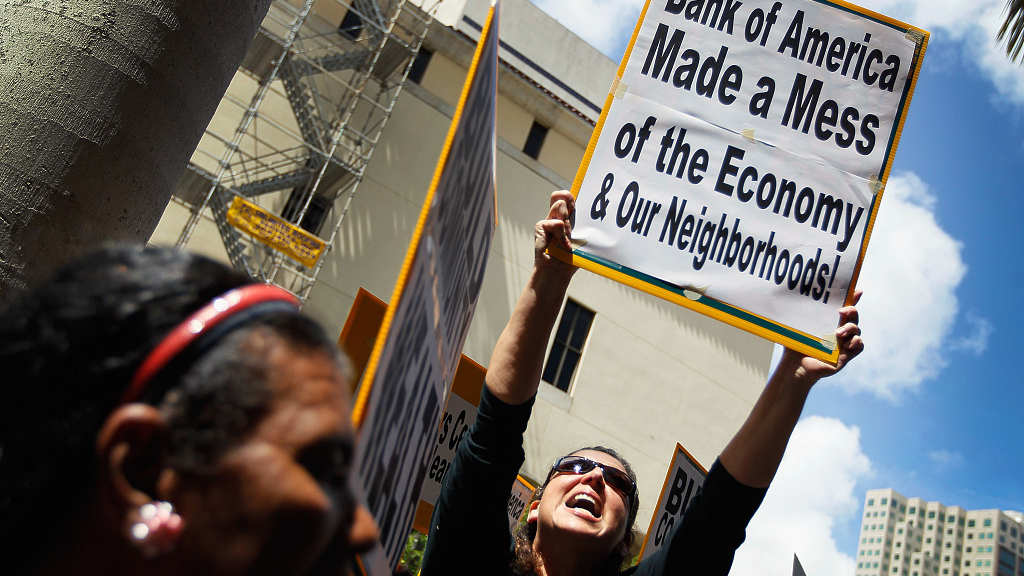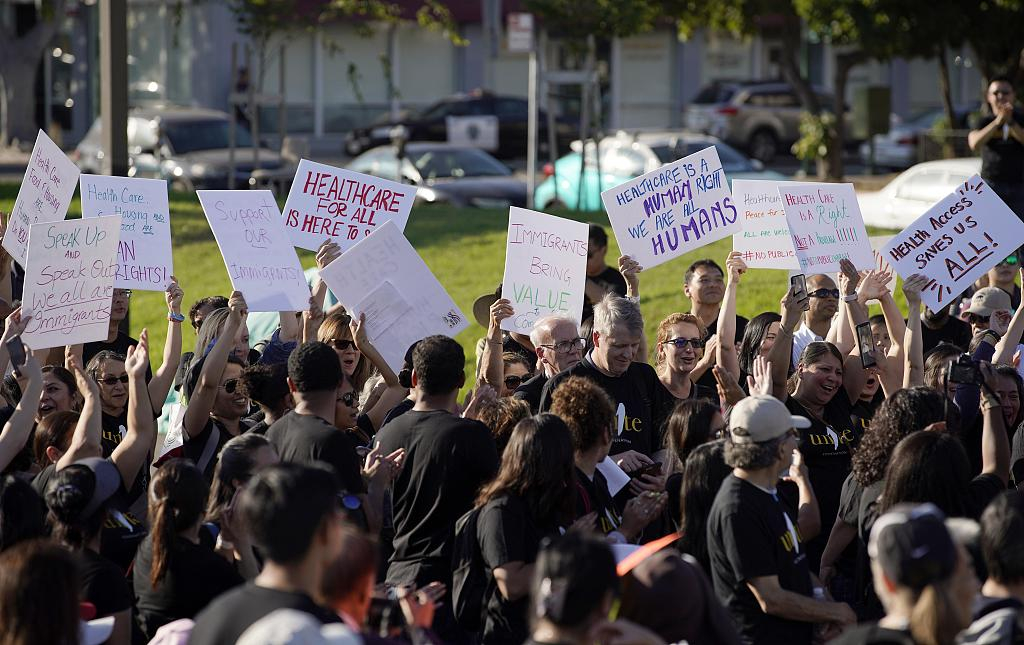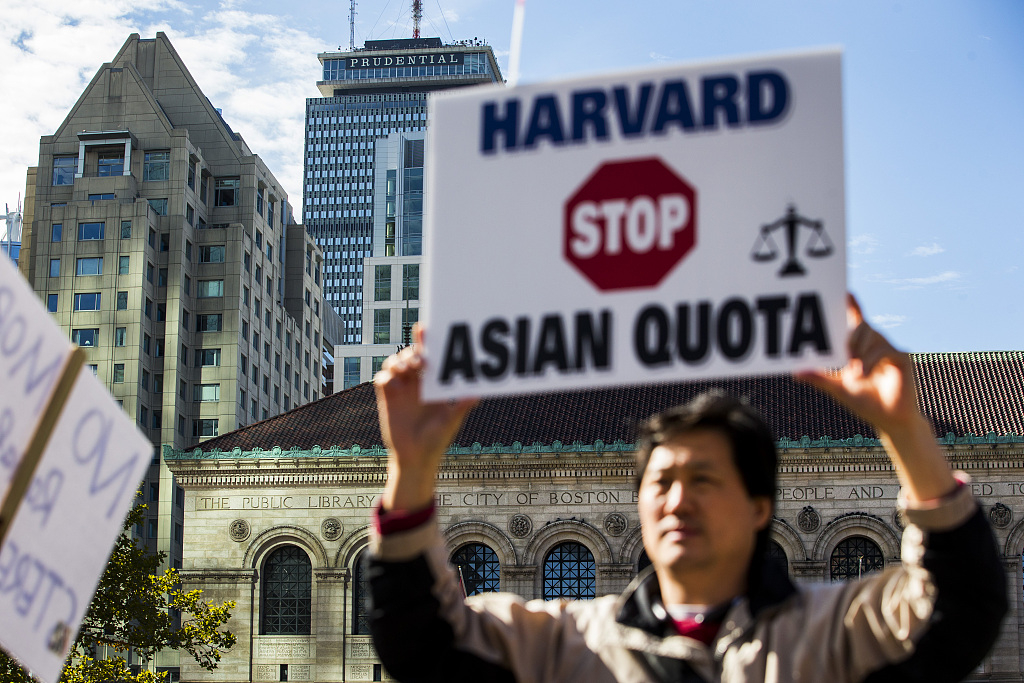
Black community residents protest in an event organized by the Miami Workers Center in front of a Bank of America branch in Miami, Florida, May 3, 2012. /VCG Photo
Black community residents protest in an event organized by the Miami Workers Center in front of a Bank of America branch in Miami, Florida, May 3, 2012. /VCG Photo
Editor's note: Freddie Reidy is a freelance writer based in London. He studied history and history of art at the University of Kent, Canterbury, specializing in Russian history and international politics. The article reflects the author's opinion, and not necessarily the views of CGTN.
American journalist and author Lionel Shriver and British conservative author and political commentator Douglas Murray hosted a debate earlier this week about a way of thinking which has come to be referred to as 'identity politics.' Shriver defined this movement as "a single-minded obsession with viewing everything in life, in history, through the prism of rivalry and power relationships between groups." It is a way of thinking which seeks to divide groups by ethnicity, sex, sexual preference, and other differentiating factors. And these groups use past prejudice and their perceived identity to explain their present situation. Where does this theory take us and how widespread is it?
Power is sought in the pursuit of moral righteousness and a consequential inhibited ability to cast judgement. The fragmenting of society into these groups creates an adversarial environment in a competition of who is more oppressed. Power is therefore derived, Shriver argues, by 'seeing your powerlessness as your power.' This way of thinking though, entrenches the past injustices these individuals feel have characterized their lives. As, without that legacy, there is no power. This leads people to embrace these labels as the source of their identity.
The lens of identity politics, Shriver argues, is 'flattening.' It is flattening for a variety of reasons, not simply because it divides people into identity groups but because it causes people to judge another based on a criteria for which they have no agency like race, sex etc. rather than on the merit of their argument. It is therefore, a breakdown in the meritocracy of ideas.

Hundreds of Asian immigrants and immigrant rights advocates gather in Oakland, California to protest the Trump administration's new rule, August 27, 2019. /VCG Photo
Hundreds of Asian immigrants and immigrant rights advocates gather in Oakland, California to protest the Trump administration's new rule, August 27, 2019. /VCG Photo
There is a term 'staying in your lane' which refers to people not deviating from their own experience or identity. It would be wrong therefore for a white individual to talk about black racial oppression. We see this notion at work in the arts and in wider culture with accusations of 'cultural appropriation.'
Indeed, Shriver herself caused controversy when speaking at the Brisbane Literary Festival in 2016, while addressing a case in the U.S. where two white students faced impeachment by their university for wearing sombreros to a tequila party because it was deemed as cultural appropriation.
Shriver said: "The moral of the sombrero scandal is clear: You're not supposed to wear other people's hats. Yet that's what (as writers) we're paid to do, isn't it? Step into other people's shoes and try on their hats?" Australian social activist Yassmin Abdel-Magied walked out at this point claiming the speech was "a celebration of the unfettered exploitation of the experience of others." Many a writer may take that as a compliment but that was not the intention. The intention is to confine people to 'their lane.'
The danger is that we are preventing a greater understanding of other people, cultures and perhaps our own sense of self. There is a certain hypocrisy in a 'call out' culture that seeks moral authority through past injustice, without a path of developing understanding and reconciliation.
The effects of this way of thinking are by no means confined to the arts though. It has taken root in policy legislation in business, government and education. This is where we see a transference from the breakdown in the meritocracy of ideas to a breakdown of meritocracy itself.
The U.S. has a blunt tool to address social disparity — 'affirmative action' or 'positive discrimination.' The Harvard admission scandal was evidence of the shortcomings of this process where Asian students were discriminated against on 'personality grounds' as a way of maintaining an ethnic balance. Based on academic attainment, there would be a far higher number of Asian students. Conversely in California, race was removed from the application process and the number of Asian students dramatically increased.
This example also reveals a greater flaw in identity politics. One of the tendencies when seeing the world through this lens, is the belief that one's situation can simply be explained by past injustices. In the U.S., this view does not explain the Chinese experience. The Chinese community suffered repeatedly, including the Asian Exclusion Act in 1882. So how is it, in accordance with this narrative, that the Chinese populous is now one of the most high-performing demographic?

A demonstrator against Harvard University's admission process holds a sign that reads 'Harvard Stop Asian Quota' during a protest at Copley Square in Boston, Massachusetts, U.S., Sunday, October 14, 2018. /VCG Photo
A demonstrator against Harvard University's admission process holds a sign that reads 'Harvard Stop Asian Quota' during a protest at Copley Square in Boston, Massachusetts, U.S., Sunday, October 14, 2018. /VCG Photo
Despite great progress in social reform, there is a sense in the West that social inequality has never been worse, racism never more pervasive and intolerance never more widespread. Indeed, many concerns do remain and of course many issues must be tackled. It is interesting that in the U.S. in 2010, 25 percent of white liberals believed that racial injustice was a serious issue for the country. By 2016 it was at 58 percent — both figures were higher than the perceived threat felt by black and Hispanic individuals who were polled. These contradictions highlight the importance of the perceived injustice as a source of power and indicate the source of that power — white liberal elites.
It is not that the injustices weren't genuine though, but are they the sole cause of present societal ills? There is a growing tendency associated with identity politics which leads us to look to past injustices rather than to apply the same level of scrutiny to ourselves.
There are many burning injustices, but identity politics is a warped lens to view our society through. It is divisive, it is overly simplistic and has more to do with a competition for moral authority than it does to finding solutions to the wrongs it seeks highlight. As former President Obama said on the subject on Wednesday, "If all you're doing is casting stones, you are probably not going to get that far."
(If you want to contribute and have specific expertise, please contact us at opinions@cgtn.com.)